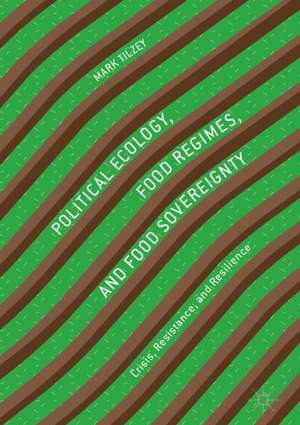Political Ecology, Food Regimes, and Food Sovereignty: Crisis, Resistance, and Resilience
Autor Mark Tilzeyen Limba Engleză Hardback – 13 noi 2017
Political Ecology, Food Regimes, and Food Sovereignty explores whether there are environmental limits to capitalism and its economic growth by addressing the ongoing and inter-linked crises of food, fossil fuels, and finance. It also considers its political limits, as the globally burgeoning ‘precariat’, peasants and indigenous people resist the further commodification of their livelihoods.
This book draws from the field of Political Ecology to approach new ways of analysing capitalism, the environment and resistance, and also to propose new solutions to the current agro-ecological-economiccrisis.
It will be of particular interest to students and academics of Environmental Sociology, Human Geography, and Environmental Geography.
| Toate formatele și edițiile | Preț | Express |
|---|---|---|
| Paperback (1) | 701.40 lei 6-8 săpt. | |
| Springer International Publishing – 24 aug 2018 | 701.40 lei 6-8 săpt. | |
| Hardback (1) | 704.50 lei 6-8 săpt. | |
| Springer International Publishing – 13 noi 2017 | 704.50 lei 6-8 săpt. |
Preț: 704.50 lei
Preț vechi: 828.82 lei
-15% Nou
Puncte Express: 1057
Preț estimativ în valută:
134.82€ • 146.40$ • 113.25£
134.82€ • 146.40$ • 113.25£
Carte tipărită la comandă
Livrare economică 22 aprilie-06 mai
Preluare comenzi: 021 569.72.76
Specificații
ISBN-13: 9783319645551
ISBN-10: 3319645552
Pagini: 394
Ilustrații: VIII, 394 p.
Dimensiuni: 148 x 210 x 31 mm
Greutate: 0.63 kg
Ediția:1st ed. 2018
Editura: Springer International Publishing
Colecția Palgrave Macmillan
Locul publicării:Cham, Switzerland
ISBN-10: 3319645552
Pagini: 394
Ilustrații: VIII, 394 p.
Dimensiuni: 148 x 210 x 31 mm
Greutate: 0.63 kg
Ediția:1st ed. 2018
Editura: Springer International Publishing
Colecția Palgrave Macmillan
Locul publicării:Cham, Switzerland
Cuprins
1. Introduction .- Section 1: Political Ecology, Food Regimes, and Food Sovereignty .- 2.Political Ecology and Social Systems: An Integrated, but Differentiated, Theory of Socio-Natural Dynamics .- 3. Political Ecology, Capitalism, and Food Regimes .- 4.The ‘First’ or British ‘Liberal’ Food Regime 1840-1870; The ‘Second’ or ‘Imperial’ Food Regime 1870-1930 .- 5. The Rise and Demise of the ‘Third’ or ‘Political Productivist’ Food Regime 1930-1980 .- Section 2: Crisis and Resistance .- 7. The Neoliberal Food Regime in Crisis? .- 8. Crisis and Resistance: Reform or Revolution? .- Section 3: Country Case Studies .- 9. Prelude to the Country Case Studies: The Agrarian Question and Food Sovereignty Movements .- 10. Bolivia .- 11. Ecuador .- 12. Nepal .- 13. China .- Section 4: Resilience as Counter-Hegemony .- 14. ‘Understanding the World in Order to Change It’: What Might Food Sovereignty Look Like? Or a Normative Political Ecology as Livelihood Sovereignty.
Notă biografică
Mark Tilzey is Senior Research Fellow in the Governance of Food Systems for Resilience at Coventry University, UK. His research interests include political ecology, agroecology, agri-environmental politics and governance, and the international political economy of agri-food systems.
Textul de pe ultima copertă
This book asks how we are to understand the relationship between capitalism and the environment, capitalism and food, and capitalism and social resistance. These questions come together to form a study of food regimes and the means by which capitalism organises both the environment and people to provision its distinctive system of ever-expanding consumption with food.
Political Ecology, Food Regimes, and Food Sovereignty explores whether there are environmental limits to capitalism and its economic growth by addressing the ongoing and inter-linked crises of food, fossil fuels, and finance. It also considers its political limits, as the globally burgeoning ‘precariat’, peasants and indigenous people resist the further commodification of their livelihoods.
This book draws from the field of Political Ecology to approach new ways of analysing capitalism, the environment and resistance, and also to propose new solutions to the current agro-ecological-economic crisis. It will be of particular interest to students and academics of Environmental Sociology, Human Geography, and Environmental Geography.
Political Ecology, Food Regimes, and Food Sovereignty explores whether there are environmental limits to capitalism and its economic growth by addressing the ongoing and inter-linked crises of food, fossil fuels, and finance. It also considers its political limits, as the globally burgeoning ‘precariat’, peasants and indigenous people resist the further commodification of their livelihoods.
This book draws from the field of Political Ecology to approach new ways of analysing capitalism, the environment and resistance, and also to propose new solutions to the current agro-ecological-economic crisis. It will be of particular interest to students and academics of Environmental Sociology, Human Geography, and Environmental Geography.
Caracteristici
Proposes the use of Political Ecology for a coherent understanding of the socio-environmental dynamics of capitalism Explores new paths of transition towards more sustainable and resilient futures Critically engages with problematic yet prevalent approaches towards understanding the notion of ‘environment and society’
